We are halfway through spring now, and heading towards the end of the calendar year, so the awards season is slowing down. However, they haven’t stopped, as you’ll see at the end of this post.
Oh October
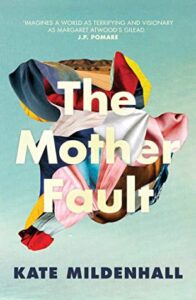 Our October count of 37 reviews, is down a little on both last October (43) and last month (42), but we are still moving forward, which is good! Here are the highlights:
Our October count of 37 reviews, is down a little on both last October (43) and last month (42), but we are still moving forward, which is good! Here are the highlights:
- Our most reviewed author this month was Kate Mildenhall with her new book The mother fault. Several authors were reviewed twice.
- Our most reviewed book was, surprise surprise, The mother fault.
- Our top reviewer was Nadia King (GoodReads) with 4 reviews. Several reviewers were runners-up with two reviews!
- Eight, or just over 20%, of this month’s reviewed were classified as Speculative fiction.
The Classics
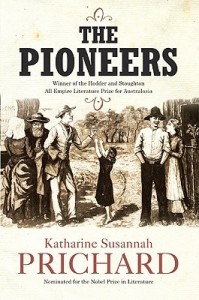 Two classics were reviewed in October, which is two more than last month. Woo hoo! A big thanks to Bill (The Australian Legend) and Brona (Brona’s Books) for holding up the side.
Two classics were reviewed in October, which is two more than last month. Woo hoo! A big thanks to Bill (The Australian Legend) and Brona (Brona’s Books) for holding up the side.
Bill reviewed Katharine Susannah Prichard’s The pioneers (1915), which is about white pioneers in the Gippsland area of Victoria around the 1840s. He discusses the book in terms of his theories regarding independent Australian women writers, and what they wrote about, but argues that this book owes more to Rolf Boldrewood’s Robbery under arms than Miles Franklin’s influence to which Prichard owns. However, he says, the book still has “an admirable dash of Independent Woman thrown in, and some lovely descriptive prose”, and concludes that “it’s a good story, well told”. I concur!
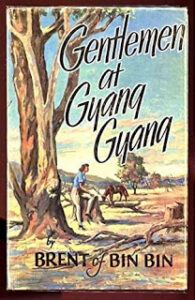 Brona reviewed Miles Franklin’s Gentleman at Gyang Gyang (1956), which was originally published under her pseudonym, Brent of Bin Bin. Brona writes that she “didn’t know what to expect from Gentlemen at Gyang Gyang, so I was rather surprised to realise I was reading an Australian rural romance, set in the beautiful Snowy Mountains region of Monaro”. She discusses the book’s plot and themes, and some of its weaker aspects, but says that she enjoyed it more than she expected and would read more Brent of Bin Bin books.
Brona reviewed Miles Franklin’s Gentleman at Gyang Gyang (1956), which was originally published under her pseudonym, Brent of Bin Bin. Brona writes that she “didn’t know what to expect from Gentlemen at Gyang Gyang, so I was rather surprised to realise I was reading an Australian rural romance, set in the beautiful Snowy Mountains region of Monaro”. She discusses the book’s plot and themes, and some of its weaker aspects, but says that she enjoyed it more than she expected and would read more Brent of Bin Bin books.
Speculative fiction
When devising the genres for this challenge, we deliberately kept them very broad to avoid becoming too embroiled in definition discussions, though you can never completely escape them. Speculative fiction is one of the most broad of our genres including, as it does, science fiction, fantasy, dystopian fiction and all sorts of sub-genres and cross-overs with other genres. This genre, perhaps more than any other, lends itself to what we call “genre-benders”, and it is often, though not always, the genre-benders that find their way into this “literary” area of the challenge. This month some 8 reviews were for Speculative fiction, with 6 of these also tagged genre-benders.
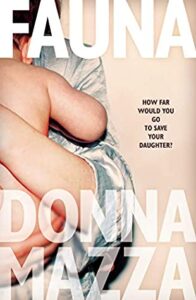 These six were for three books, Donna Mazza’s Fauna (2), Kathleen Jennings Flyaway (1) and Kate Mildenhall’s The mother fault (3). Mazza’s Fauna joins several books published in Australia in the last year or so that explore some sort of relationship between science, future technologies and animals. Fauna looks at DNA technology being used to reverse the extinction of creatures like the mammoth and the Tasmanian Tiger, and explores how far such technology might go. Dylan Dartnell reviewed it for Underground Writers saying that as well as exploring “the delicacies of motherhood”, it presents “a scientific phenomenon that feels eerily near” making the “work feel anything but another fictional tale”. Jackie (GoodReads) also focused on the main theme of motherhood, but frames it another way, saying:
These six were for three books, Donna Mazza’s Fauna (2), Kathleen Jennings Flyaway (1) and Kate Mildenhall’s The mother fault (3). Mazza’s Fauna joins several books published in Australia in the last year or so that explore some sort of relationship between science, future technologies and animals. Fauna looks at DNA technology being used to reverse the extinction of creatures like the mammoth and the Tasmanian Tiger, and explores how far such technology might go. Dylan Dartnell reviewed it for Underground Writers saying that as well as exploring “the delicacies of motherhood”, it presents “a scientific phenomenon that feels eerily near” making the “work feel anything but another fictional tale”. Jackie (GoodReads) also focused on the main theme of motherhood, but frames it another way, saying:
Fauna is another book about controlling women’s reproductive capacities, in the same vein as Margaret Atwood’s seminal text: The Handmaid’s Tale, thought not quite as compelling.
Marianne (Cloggie Downunder), Theresa (Theresa Smith Writes) and Veronica Strachan (GoodReads) all reviewed Mildenhall’s second novel The mother fault, which is about a man, Ben, mysteriously going missing even though he is “chipped”, and his wife and children being controlled or threatened in various ways. Like Fauna, this is about motherhood, but it is also about “a planet in crisis”. Theresa calls it a “pacey dystopian thriller” and “a significant work of eco-literature”. Veronica also appreciated its wider message, and Marianne says its near future setting
is highly plausible and the subject matter is extremely topical: the technology aspect, the influence of multi-nationals, and the government attitude to refugees will all feel familiar.
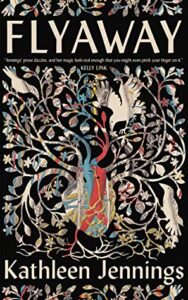 The third speculative genre-bender reviewed, Kathleen Jennings’ Flyaway, is something rather different with at least a foot, it seems, in the fantasy side of the genre. It’s a debut novel that reads, says Cass Moriarty, like “a fairy tale or a fable, a myth or a legend”. It is set in “outback Queensland, where country folk believe in superstitions and the power of the unknown”. She found it a mesmerising read saying that she’s not sure she fully understood it, but, she says:
The third speculative genre-bender reviewed, Kathleen Jennings’ Flyaway, is something rather different with at least a foot, it seems, in the fantasy side of the genre. It’s a debut novel that reads, says Cass Moriarty, like “a fairy tale or a fable, a myth or a legend”. It is set in “outback Queensland, where country folk believe in superstitions and the power of the unknown”. She found it a mesmerising read saying that she’s not sure she fully understood it, but, she says:
It is such an odd book. And yet that oddness makes it unique. Read it for the language, for the voice, for the evocative description and for the magical realism.
And, I’d add, buy it for that gorgeous cover!
Awards News
Literary awards announcements continue with the following over the last month:
ARA Historical Novel Prize Winner
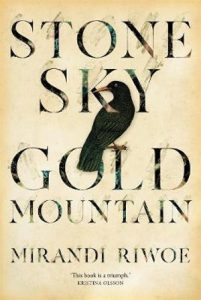 The winner of this new prize worth $50,000 is Mirandi Riwoe’s Stone Sky Gold Mountain, and we have a review for it this month! It’s about two Chinese siblings, Ying and Lai Yue, who travel to Far North Queensland to seek their fortune on the gold fields. Angharad (Tinted Edges) loved the book, detailing all the reasons why, including the characterisation and the way the novel explores issues like racism and mental health. She concludes that it is “a rich, touching novel [that makes a] critical and necessary contribution to Australian historical fiction”. It’s certainly on my radar, because, like Angharad, I greatly liked Riwoe’s debut novel, The fish girl.
The winner of this new prize worth $50,000 is Mirandi Riwoe’s Stone Sky Gold Mountain, and we have a review for it this month! It’s about two Chinese siblings, Ying and Lai Yue, who travel to Far North Queensland to seek their fortune on the gold fields. Angharad (Tinted Edges) loved the book, detailing all the reasons why, including the characterisation and the way the novel explores issues like racism and mental health. She concludes that it is “a rich, touching novel [that makes a] critical and necessary contribution to Australian historical fiction”. It’s certainly on my radar, because, like Angharad, I greatly liked Riwoe’s debut novel, The fish girl.
Prime Minister’s Literary Awards shortlists
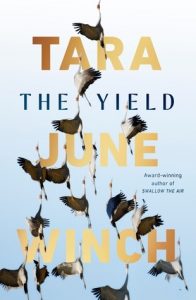 These awards have multiple categories but I’m including the most relevant ones here, though not all non-fiction and Australian history technically meet the “literary and classic” criteria.
These awards have multiple categories but I’m including the most relevant ones here, though not all non-fiction and Australian history technically meet the “literary and classic” criteria.
Fiction (4 of 5 by women)
- Carrie Tiffany’s Exploded view
- Lucy Treloar’s Wolfe Island
- Tara June Winch’s The yield
- Charlotte Wood’s The weekend
All of these have been reviewed for the challenge, but this month there were two reviews for Tara June Winch’s The yield. Veronica Strachan (GoodReads) wrote of protagonist August that “My heart ached for the gradual unfolding of her grief, her repressed memories, and her uncertain future under the machinations of big mining”, while Angharad (Tinted Edges) also appreciated the novel, commenting that it’s a “brilliantly crafted novel that combines three narrative techniques to create a compelling and multifaceted story”. She discusses each of these narrative techniques, in terms of how they contribute to the “truth-telling” that underpins the book.
Non-fiction (4 of 5 by women)
- Gay’wu Group of Women’s Songspirals: Sharing women’s wisdom of country through songlines
- Jess Hill’s See what you made me do: Power, control and domestic abuse
- Christina Thompson and William Collins’ Sea people: The puzzle of Polynesia
- Jessica White’s Hearing Maud: A journey for a voice
Three of these have been reviewed for the challenge, but we would love to see one for Sea people.
Australian history (4 of 5 by women)
- Judith Brett’s From Secret ballot to democracy sausage: How Australia got compulsory voting
- Tiffany Shellam’s Meeting the Waylo: Aboriginal encounters in the Archipelago
- Marilyn Lake’s Progressive new world: How settler colonialism and transpacific exchange shaped American reform
- Susan Lawrence and Peter Davies’s Sludge: Disaster on Victoria’s goldfields
We are not wonderful here at reviewing Australian history – with a few exceptions – so I’m not surprised to find that of these only Judith Brett’s book has been reviewed for the challenge, though a few other books by Lake have also been.
There were also shortlists for Poetry, and Children’s and Young Adult Literature
Keep well, keep safe, and keep reading!
———————
About Me
I am Whispering Gums and I read, review and blog about (mostly) literary fiction. It was reading Jane Austen when I was 14 years old that turned me on to reading literary fiction/classics, which is why I am here today doing this round-up! Little did Jane know what she started!
My love of Aussie literature started with Banjo Paterson’s ballads and Ethel Turner’s Seven Little Australians in my childhood. But, I didn’t really discover Australian women’s writing until the 1980s when I fell in love with Elizabeth Jolley, Thea Astley, Olga Masters, Helen Garner and Kate Grenville. Ever since then I have been included a good percentage of Australian (and other) women writers in my reading di





There’s so much wonderful writing by women around at the moment! Without deliberately setting out to read Australian women writers, it seems that I’ve been surrounded by them over lockdown, (with a few notable exceptions such as Corey White’s memoir).
Thanks Marian – and welcome here. I’m glad you’ve been surrounded by Australian women writers!